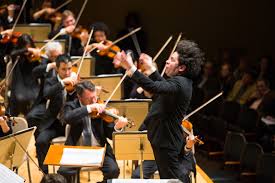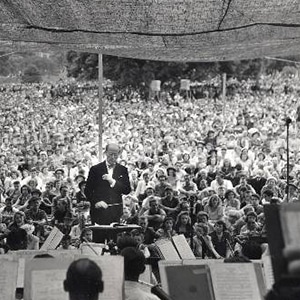Music hire rates could go through the roof
mainHere’s an alarming document that’s going round US orchestras right now:
We wanted to make you aware of an issue regarding the Performing Rights Organizations (PRO) BMI and ASCAP that could have a significant impact on the concert industry. The U.S. Department of Justice is considering ending the Antitrust Consent Decrees which have regulated both BMI and ASCAP since the early 1940s. These Consent Decrees require, among other things, that both organizations provide licenses to anyone who requests a license and to apply standardized fees for the performance of works by similarly situated licensees. The termination of the Consent Decrees would allow these PROs to significantly increase rates without any of the judicial or DOJ oversight required under the Consent Decrees, allow differing fees between presenters and give them the ability to decline licenses potentially giving the PROs the ability to control which acts presenters may hire. This could also create significant uncertainty in how venues and promoters would license performance rights for events going forward. BMI is in the Rate Court right now requesting licensing fees that include percentages of additional revenue earned from secondary markets, sponsorships, VIP packages, ticket broker charges and other relevant streams of income. Although we do not know how the Rate Court will decide this issue, without judicial oversight under the Consent Decrees, it will be much easier for the PROs to pursue these additional revenue streams.
There is a short window of time to provide comments to the DOJ and your state representatives in Congress. August 9, 2019 is the deadline for comment. If you feel that this change may affect your business, you can submit comments directly to the DOJ at ATR.MEP.Information@usdoj.gov; or fill out the form at the Music Innovation Consumers site, which will be sent to your state official – https://p2a.co/tKFkiap. Please feel free to share these links with any interested parties.
One major orchestra has swiftly responded:
This issue is also happening with all the orchestras and the Orchestra League has hired a lawyer to work on this as its extremely serious. The lawyer has written a letter to the DOJ signed by as many orchestras that want to participate, objecting to the ending of the Consent Decrees.






In two words please – more money?
This is not a sexy issue, and you have to both parse the legalese and the potential bias in whoever sent this initial document. However, music rights are an absolute archaic mess for American orchestras, both in how you present a live concert and how you create digital content out of those concerts. The agreements in place have made American orchestras relatively invisible online when compared with their European counterparts who rightly have recognized like popular musicians that the live concert is your product and recording and videos are not a source of revenue but a way to drive people to your actual product. Sadly the best American orchestra in this regard is probably Detroit who broke with the national agreement when they went through bankruptcy. It shouldn’t take a bankruptcy to be allowed to innovate.
The PRO fees have little to no effect on online performances. What is stopping online performances is the rates charged by the musicians. It is amazing that in this day and age anyone would think publishers and composers are getting rich off of orchestras. All orchestras have to do is pay a blanket ASCAP and BMI license, which is a fractional part of their budgets. It is shameful to see commenters trying to blame composers for the problems orchestras are having.
This can only be good news, no more performing pieces that require licenses (read contemporary crap). Thank God Mozart’s free. And since 2019, Bolero.
Ah yes, Prokofiev, Rachmaninoff, Copland, Bernstein… the latter careers’ of Gershwin, Elgar, Stravinsky, Vaughan Williams… all well known perpetrators of contemporary crap.
What contemporary composers are so essential that a “through the roof” fee would actually succeed in the market?
Couldn’t most ensembles walk away from an excessive fee and program more Beethoven instead?
“What contemporary composers are so essential that a “through the roof” fee would actually succeed in the market?” . . . Lin-Manuel Miranda
The monies collected by BMI and ASCAP go directly to the publishers and composers. Both rely on this income to survive. The only parties severely impacted are choreographers with small companies who must pay significant amounts for grand rights to music such as Bartok’s Music For Strings, Percussion and Celeste, one of the most commonly choreographed works. Without this income, the publishers will die.
And people wonder why so many concerts consist of old war horses. They’re in public domain and out of the reach of lawyers.